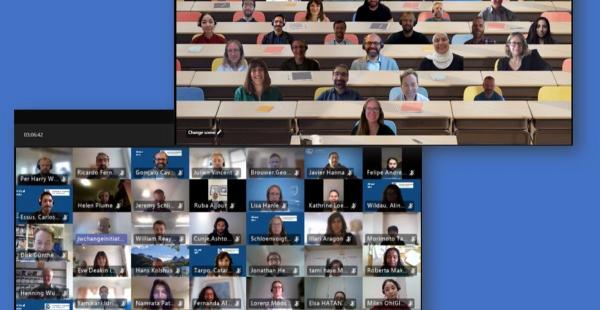
Annual Partnership Retreat (APR) from 5th to 7th of October 2021: Promoting a Frank Exchange of Views to Hit the Ground Running in Glasgow
The 10th Edition of the Annual Partnership Retreat (APR) of the Partnership on Transparency in the Paris Agreement (PATPA), took place, once again, virtually on October 5-7, 2021.
Over the three consecutive days, 95 participants engaged in the discussions: 75 country representatives from 34 countries and 20 non-party stakeholders from 8 international organizations.
The 2021 virtual edition of the APR was convened to provide a (last) opportunity for transparency negotiators to exchange views before they head out to COP26 in Glasgow in late October.
In light of the urgency of adopting these final pieces of the Enhanced Transparency Framework (ETF) and of the Paris Rulebook, the APR asked participants to be bold and to be prepared to share and discuss with other participants their key priorities and their views on where landing grounds can be found.
The first day was dedicated to priorities and landing grounds for Common Reporting Tables (CRT) for GHG inventories, while the second day was devoted to Common Tabular Formats (CTF) for tracking progress and achieving NDCs. The third day was dedicated to a brief discussion on outlines of reports, as well as to CTF for support.
Across the three days of the APR, there was a widespread view of the urgency to reach agreement on all aspects of the ETF as well as a broad understanding that such agreement needed to be reached in Glasgow if there is to be enough time for countries to prepare the transition to the ETF. Time for such transition is particularly important for developing countries, which are faced with greatest capacity constraints in addition to not having previous experience in using CTF.
Participants were generally of the view that efforts to support developing countries building capacity to transition to the ETF and in particular to use CTF need to be intensified in the coming years, noting, nonetheless, the many different bilateral and multilateral ongoing initiatives, including CBIT.
Participants noted that CTF have an important intrinsic value, as they make everyone’s work easier: from the national reporter to the technical reviewer and the general public. They also noted that, while many developing countries will encounter barriers in providing all the required information in these tables, the flexibility provisions, the concept of improving over time and a non-punitive technical review process should provide enough assurance to all countries that a robust deck of common tabular formats can be adopted in Glasgow.
As a rule, participants acknowledge that, besides the most controversial issues (usually connected to discussions happening under other agenda items), there is a lot of work that needs to be done to go through all the tables, some of them rather technically complex. To address this issue, many argued that negotiators should sit together as soon as possible in Glasgow working table by table, row by row, column by column. The informal note coming out of the June SB session provides a good basis for that. Participants also noted that, in order to gain momentum, these technical discussions could start with some of the seemingly simpler tables, such as the background tables for the waste sector for GHG inventories or the tables on GHG emissions projections for tracking progress made in implementing and achieving NDCs.
Participants were keen to recall the important progress achieved in Madrid on the CTF for support mobilized, provided, needed and received and were confident that the good spirit thus far will be kept in Glasgow allowing also for the completion of work in this area.
The 10th edition of the APR played once again an important role in building trust among participants, as it provided a space for open sharing of ideas, concerns and proposals on how to hit the ground running in Glasgow and ensure the adoption of the CRTs and CTFs at COP26, so as to ensure all Parties have the opportunity to plan and implement a smooth transition to the ETF by 2024.
Contact
Secretariat| Annual Partnership Retreat (APR) | Partnership on Transparency in the Paris Agreement (PATPA)
Catarina Tarpo & Carlos Essus
Email: @email
Co-organized by:
- Federal Ministry for the Environment, Nature Conservation and Nuclear Safety (BMU), Germany
- Greenhouse Gas Inventory and Research Center (GIR), Republic of Korea
- The Department of Forestry, Fisheries and Environment (DFFE), Republic of South Africa

